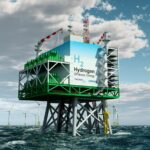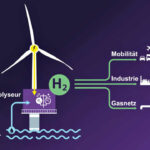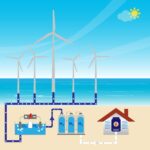Northern Germany as a predestined region
The five northern German states are united by the political will to develop a hydrogen economy, as they have exceptionally favourable location conditions for this like no other region in Germany.
The five northern German states – Who we are
.
Each of the five northern states of Bremen, Hamburg, Mecklenburg-Western Pomerania, Lower Saxony and Schleswig-Holstein has very specific locational advantages which, when viewed together, complement each other ideally.
Northern Germany’s unique selling points – What makes us unique
.
In terms of sustainable development, established structures and existing locational advantages should be used for the development of a green hydrogen economy and the efficient implementation of the energy transition. Northern Germany is ready to be a pioneer for the development of a green hydrogen economy.
With its high share of electricity from renewable sources, especially wind power, northern Germany is already contributing more than any other region in Germany to achieving the goals of the energy transition. At the same time, this creates the conditions for the next transformation step of sector coupling with the goal of largely defossilising sectors such as mobility and industry through the use of hydrogen as a storage medium, raw material, energy carrier and drive energy. Northern Germany combines the necessary location conditions in a unique combination.
Constant offshore wind power
.
A large number of offshore wind farms already exist in the constantly windy coastal waters. A high potential for expansion is also seen here. The landfall points for offshore wind power as a source of green hydrogen are located on the coasts of northern Germany. Due to the high annual operating hours of offshore wind power plants, possibly in combination with photovoltaic ground-mounted systems on the coast, the conditions here in the north are particularly good for a high utilisation of electrolysis units and thus for lower production costs for green hydrogen.
Understandable conditions for a high utilisation of electrolysis units and thus for lower production costs for green hydrogen.
Underground storage formations
.
The geological conditions in the North German Plain are unique in Europe for the large-volume intermediate storage of hydrogen in caverns. The theoretical storage capacity of all caverns in Germany (converted to hydrogen) is around 28 terawatt hours. That would correspond to about three days’ energy consumption in Germany. Northern Germany thus has the best prerequisites for becoming Europe’s climate-neutral energy storage facility. The caverns in northern Germany can be successively converted or newly developed in line with demand.
Sea caverns can be successively converted or newly developed in line with demand.
Seaports as logistics and economic centres
.
Germany’s seaports can be used in the short term as logistics centres for the provision and import or export of hydrogen and synthetic fuels produced on its basis. As hubs between sea and inland waterway transport on the one hand and rail and road transport on the other, ports have a prominent position in the transport sector. This is where the various modes of transport converge and participate from each other (combined transport). At the same time, industrial and commercial settlements are concentrated in and around ports. Ports are the outstanding connecting structural element of the northern German Länder.
Schleswig-Holstein
Schleswig-Holstein “Although there is now a broad consensus that the restructuring of the energy system will not succeed without hydrogen, the federal government is lacking the decisive impetus to really move the issue forward. That
Niedersachsen
Niedersachsen “Together with the other northern German states, Lower Saxony has the potential to become the leading region for a green hydrogen economy. We have exactly the potential that is needed to take on a
Mecklenburg-Vorpommern
Mecklenburg-Vorpommern “The energy transition can only succeed with comprehensive sector coupling. Green hydrogen is a key element in storing the renewable electricity generated in our state in the long term and making it usable for
Free and Hanseatic City of Hamburg
Free and Hanseatic City of Hamburg “For Hamburg as a major industrial and transport centre in the north, hydrogen offers great opportunities to further strengthen the economic performance of our city and its quality of
Free Hanseatic City of Bremen
Free Hanseatic City of Bremen “The state of Bremen, together with the other coastal states, will work intensively on the technology for using surplus wind power to produce hydrogen, thereby advancing an important field of



